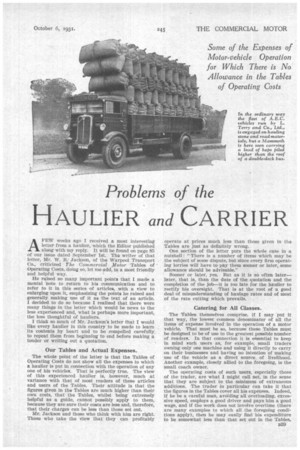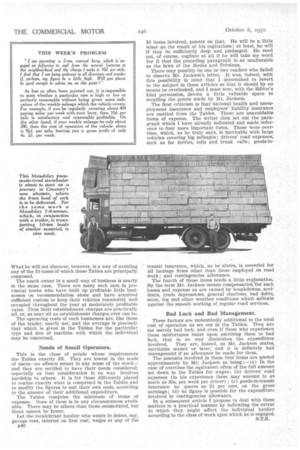Problems of the
Page 57

Page 58

If you've noticed an error in this article please click here to report it so we can fix it.
HAULIER and CARRIER
Some of the Expenses of Motor-vehicle Operation for Which There is No Allowance in the Tables of Operating Costs
AFEW weeks ago I received a most interesting letter from a haulier, which the Editor published along with my reply. It will be found on page 85 of our issue dated September 1st. The writer of that letter, Mr. W. R. Jackson, of the Warpool Transport Co., criticized The Commercial Motor Tables of Operating Costs, doing so, let me add, in a most friendly and helpful way.
He raised so many important points that I made a mental note to return to his communication and to refer to it in this series of articles, with a view to enlarging upon it, emphasizing the points he raised and generally making use of it as the text of an article. I decided to do so because I realized that there were many things in the letter which would be news to the less experienced and, what is perhaps more important, the less thoughtful of hauliers.
I think so much of Mr. Jackson's letter that I would like every haulier in this country to be made to learn its contents by heart and to be compelled carefully to repeat them from beginning to end before making a tender or writing out a quotation. .
Our Tables and Actual Expenses.
The whole point of the letter is that the Tables of Operating Costs do not show all the expenses to which a haulier is put in connection with the operation of any one of his vehicles. That is perfectly true. The view of this experienced haulier is, however, much at variance with that of most readers of these articles and users of the Tables. Their attitude is that the figures given in the Tables are much higher than their own costs, that the Tables, whilst being extremely helpful as a guide, cannot possibly apply to them, because they are sure their costs are less and, therefore, that their charges can be less than those set out.
Mr. Jackson and those who think with him are right. Those who take the view that they can profitably operate at prices much less than those given in the Tables are just as definitely wrong.
One section of the letter puts the whole case in a nutshell: "There is a number of items whieh may be the subject of some dispute, but since every firm operating lorries will have to pay them sooner or later, some allowance should be advisable."
Sooner or later, yes. But as it is so often later— later, that is, than the date of the quotation and the completion of the job—it is too late for the haulier to rectify his oversight. That is at the root of a good deal of misunderstanding of haulage rates and of most of the rate cutting which prevails.
Catering for All Classes.
The Tables themselves comprise, if I may put it that way, the lowest common denominator of all the items of expense involved in the operation of a motor vehicle. That must be so, because these Tables must be designed to be of use to the greatest possible number of readers. In that connection it is essential to keep In mind such users as, for example, small traders owning only one machine and using it directly to carry on their businesses and having no intention of making use of the vehicle as a direct source, of livelihood. Another example, closely allied to the foregoing, is the small coach owner.
The operating costs of such users, especially those of the trader, are what I might call net, in the sense that they are subject to the minimum of extraneous additions. The trader in particular can take it that the figures in the Tables cover all his expenses. Indeed, if he be a careful man, avoiding all overloading, excessive speed, employs a good driver and pays him a good wage, and if the work does not involve overtime (there are many examples to which all the foregoing conditions apply), then he may easily find his expenditure to be somewhat less than that set out in the Tables. What he will not discover, however, is a way of av.oiding any of the 10 items of which those Tables are principally composed.
• The coach owner in a small way of business is nearly in the same case. There are many such men in provincial towns who have built up profitable little businesses on recommendation alone and have acquired sufficient custom to keep their vehicles reasonably well occupied throughout the year at moderately profitable rates. Thus their establishment charges are practically nil, or, as.near nil as establishment charges ever can be.
The operating costs of such businesses -are, like those of the trader, nearly net, and the average is precisely that which is given in the Tables for the particular type and size of machine with which the individual may be concerned.
Needs of Small Operators.
This is the class of people whose requirements the Tables exactly fill. They are lowest in the scale of users—no offence meant in any sense of the word— and they are entitled to have their needs considered, especially as that consideration in no way involves hardship to others. It is for those differently placed to realize exactly what is comprised in the Tables and to modify the figures to suit their own ends, according to the amount of their additional expenditure.
The Tables comprise the minimum of items of expense. None of them is in any circumstances avoidable. There may be others than those enumerated, but there cannot be fewer.
Let the recalcitrant haulier who wants to delete, say, garage rent, interest on first Cost, wages or any of the B40
10 items involved, ponder on that. He will be a little wiser as the result of his cogitations; at least, he will if they be sufficiently deep and puolonged. He need not, of course, cogitate at all if he will take my word for it that the preceding paragraph is as unalterable as the laws of the Medes and Persians.
There may possibly be one or two readers who failed to observe Mr. Jackson's letter. It was, indeed, with this possibility in mind that I determined to revert to the subject in these articles so that it should by no means be overlooked, and I must now, with the Editor's kind permission, devote a little valuable space to recalling the points made by Mr. Jackson.
The first criticism is that national health and unemployment insurance and employers' liability insurance are omitted from the Tables. Those are unavoidable items of expense. The writer then set out the paragraph which I have already indicated and made reference to four more important items. Those were overtime, which, as he truly says, is inevitable with large vehicles covering big mileages; drivers' road expenses,' such as for ferries, tolls and trunk calls; goods-in
transit insurance, which., as he states, is essential for all haulage firms other than those employed on road work ; and contingencies allowance.
The fourth of those items needs a little explanation. By the term Mr. Jackson means compensation*for such losses and expense as are mused by breakdowns, accidents, trade depressions, general elections, bad debts, snow, fog and other weather conditions which militate against the smooth working of regular road services.
Bad Luck and Bad Management.
These factors are undoubtedly additional to the total cost of operation as set out in the Tables. They are not merely bad luck, and even if those who experience these misfortunes insist upon ascribing them to bad hick, that in no way diminishes the expenditure involved. They are, indeed, as Mr. Jackson states, inevitable sooner or later, and it is definitely bad management if no allowance be made for them.
The amounts involved in these four itemsare quoted approximately by Mr. Jackson as being :—(a) In the case of overtime the equivalent often of the full amount set down in the Tables for wages; (b) drivers' road expenses (in his experience these may amount to as much as 35s. per week per driver) ; (c) goods-in-transit insurance he quotes as 24per cent, on the gross earnings ; (d) no figure is possible for the expenditure involved in contingencies allowance.
In a subsequent article I propose to deal with these matters in a practical manner by indicating the extent to which they might affect the individual haulier according to the class of work upon which he is engaged.




































































































